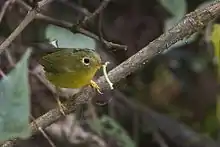Whistler's warbler
Whistler's warbler (Phylloscopus whistleri) is a species of leaf warbler (family Phylloscopidae). It was formerly included in the "Old World warbler" assemblage.
| Whistler's warbler | |
|---|---|
 | |
| from Khangchendzonga National Park, West Sikkim, India. | |
| Scientific classification | |
| Domain: | Eukaryota |
| Kingdom: | Animalia |
| Phylum: | Chordata |
| Clade: | Dinosauria |
| Class: | Aves |
| Order: | Passeriformes |
| Family: | Phylloscopidae |
| Genus: | Phylloscopus |
| Species: | P. whistleri |
| Binomial name | |
| Phylloscopus whistleri (Ticehurst, 1925) | |
| Synonyms | |
|
Seicercus whistleri | |
It is found in the Indian subcontinent, from the Himalayas to Myanmar.[2] Its natural habitats are subtropical or tropical moist montane forests and heavily degraded former forest.
Whistler's warbler was previously placed in the genus Seicercus. A molecular phylogenetic study published in 2018 found that neither Phylloscopus nor Seicercus were monophyletic.[3] In the subsequent reorganization the two genera were merged into Phylloscopus which has priority under the rules of the International Commission on Zoological Nomenclature.[4] The common name commemorates the English ornithologist Hugh Whistler (1889–1943).[5]
References
- BirdLife International (2016). "Phylloscopus whistleri". IUCN Red List of Threatened Species. 2016: e.T22732760A95049375. doi:10.2305/IUCN.UK.2016-3.RLTS.T22732760A95049375.en. Retrieved 12 November 2021.
- "Bushtits, leaf warblers & reed warblers « IOC World Bird List". www.worldbirdnames.org. Retrieved 2017-07-18.
- Alström, P.; et al. (2018). "Complete species-level phylogeny of the leaf warbler (Aves: Phylloscopidae) radiation". Molecular Phylogenetics and Evolution. 126: 141–152. doi:10.1016/j.ympev.2018.03.031. PMID 29631054. S2CID 4720300.
- Gill, Frank; Donsker, David, eds. (2018). "Bushtits, leaf warblers, reed warblers". World Bird List Version 8.2. International Ornithologists' Union. Retrieved 8 August 2018.
- Beolens, Bo; Watkins, Michael (2003). Whose Bird? Men and Women Commemorated in the Common Names of Birds. London: Christopher Helm. pp. 362–364.
